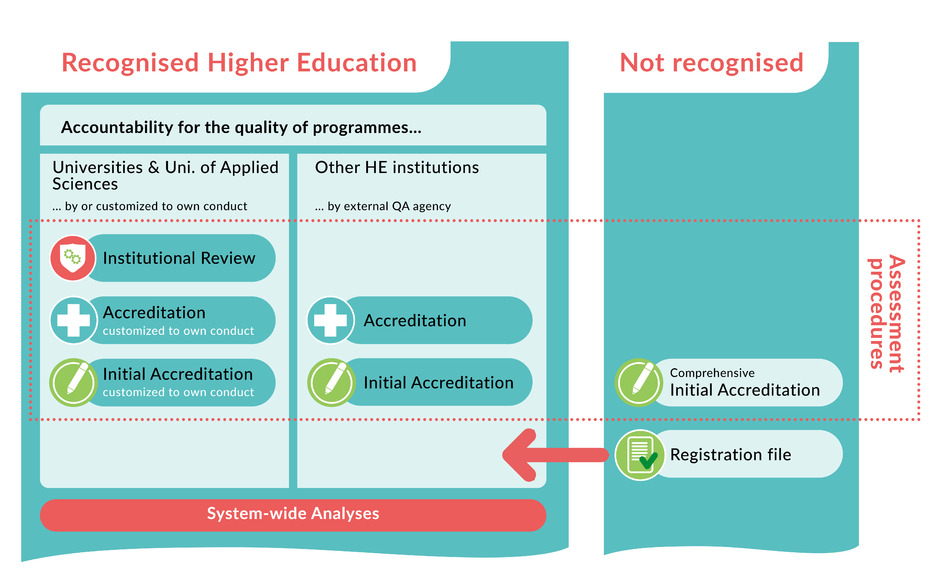The quality assurance system of Flanders
The Quality Assurance System – Flanders 2019-2025 focuses on the quality of individual programmes and its accountability. This is achieved either through the institutional review that enables universities and universities of applied sciences to account for the quality of their programmes themselves, or through the involvement of an external body. An external body is a quality assurance agency registered on the European Quality Assurance Register for Higher Education (EQAR, www.eqar.eu), or recognised by the Accreditation Organisation of the Netherlands and Flanders (NVAO, www.nvao.net) on the basis of a collaboration agreement warranting that the external assessment is conducted in accordance with the Standards and Guidelines for Quality Assurance in the European Higher Education Area (ESG, 2015). External, independent experts (peers) are engaged in each assessment of educational quality, either by the institution itself or in the assessment panel convened by NVAO or a quality assurance agency.
The quality assurance system of Flanders is based on the following characteristics:

PEER REVIEW
External, independent experts (“peers”) are involved in each of the assessments, either through an assessment panel convened by NVAO (or by another quality assurance agency), or through the institution itself. NVAO sets great store by the involvement of experts from the professional field, educational experts, and students in the assessment of the quality of education.

PUBLIC INFORMATION
The information on the quality of programmes is public. NVAO publishes its own assessment reports and decisions both on its own website and on the Higher Education Register. In addition, universities and university colleges publish information on the quality of each of their programmes on their websites. This information ensues from the control they exert and substantiates their accountability for their own quality assurance.

APPRECIATIVE APPROACH
The NVAO procedures are based on trust, which vests a large measure of responsibility with the institutions. In order to have this perspective reflected in the assessment procedures, NVAO has developed its Appreciative Approach. NVAO thus emphasises that each assessment is taking place within its own context and must be conducted in an open dialogue.

ACCREDITATION IS A CONDITION FOR THE CONFERRAL OF RECOGNISED DEGREES
The accreditation (or initial accreditation) of a programme is a condition for the conferral of recognised first, bachelor’s, and master’s degrees. These are the only programmes registered on the Higher Education Register and the only ones allowed to use the protected titles of graduaat [first degree], bachelor, and master in their communications. Only persons enrolled in such programmes qualify for the status of “student”.
Overview of the entire Flemish quality assurance system 2019-2025:

RECOGNISED HIGHER EDUCATION
Universities and university colleges
Universities and universities of applied sciences are solely responsible for confirming the quality of their programmes. They give account to society by publishing information on the quality of each NVAO accredited programme on their website. The institutional review assesses the manner in which a university or university college pursues its educational policy. Within its educational policy, each institution includes a conduct for confirming the quality of its programmes. This responsibility for confirming the quality of programmes applies to accredited programmes. For this reason, each new programme to be launched is first subjected to an initial accreditation, a procedure in which an external panel assesses the potential quality of the programme. The period of recognition as a new programme is followed by a fully-fledged programme accreditation: the official decision by NVAO that the programme meets predetermined requirements regarding quality and level. Following such programme accreditation (with a positive outcome), responsibility for confirming the quality of the programme is vested with the universities and universities of applied sciences themselves. Should an institutional review show a university’s or university college’s inability to confirm the quality of its accredited programmes, NVAO will regain this responsibility. The confirmation of quality will then be done by NVAO on a programme-by-programme basis. The initial accreditation and programme accreditation procedures are tailor-made: they are designed to optimally complement each institution’s conduct for confirming the quality of its other programmes. We here refer to conduct-tailored procedures.Other recognised institutions
All the other recognised higher education institutions give account of the quality of their programmes through the involvement of an external body. Each new programme to be launched is first subjected to an initial accreditation. Subsequently, it is subjected to periodic programme accreditations.
NON-RECOGNISED INSTITUTIONS
Non-recognised education providers may be registered by the Flemish Government as providers of recognised higher education programmes. Such recognition is based on a registration file, supplemented by a positive NVAO decision regarding the (potential) quality of the education they provide following the comprehensive initial accreditation of (at least one of) their programmes.

